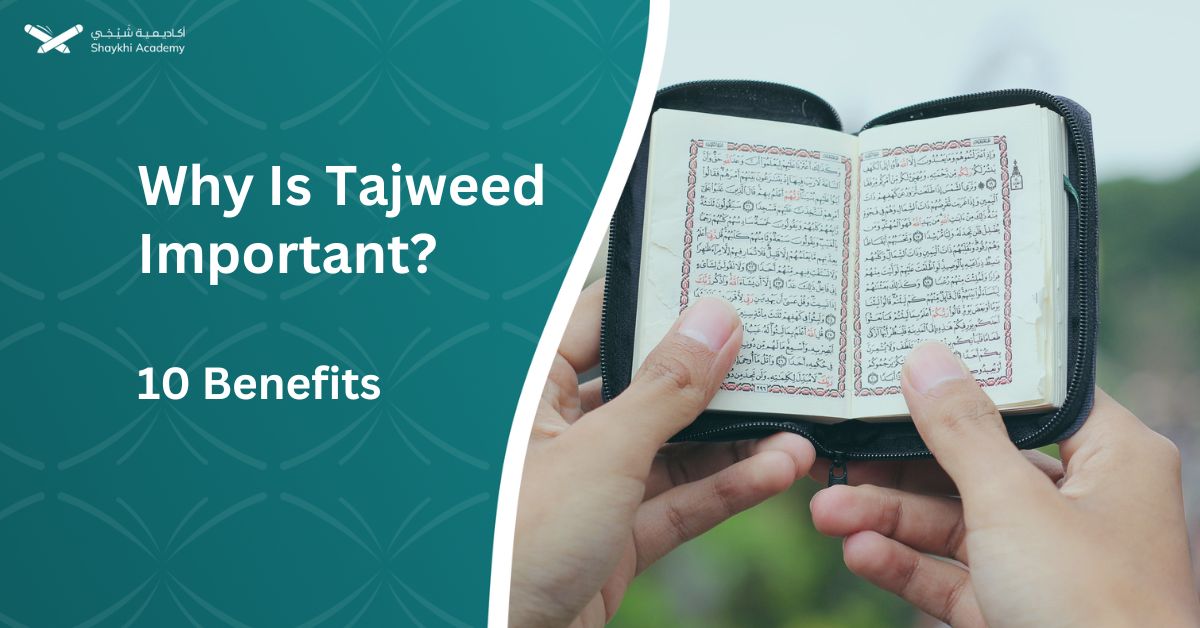Why Is Tajweed Important? Learning Tajweed is essential for Muslims to ensure the correct recitation of the Quran, preserving its authenticity and fostering a deeper spiritual connection. It serves as a preparatory step for understanding Quranic meanings, promotes continuous learning, and maintains the integrity of the sacred text.
Tajweed also sets criteria for prayer leadership and encourages sincerity in recitation, while recognizing individual capabilities and providing clear pronunciation rules.
The mastery of Tajweed, the art of correct pronunciation and recitation of the Quran, holds a profound significance in the lives of Muslims. Rooted in the principles of preserving the integrity of the sacred text.
Tajweed goes beyond the realms of mere recitation during prayers; it extends to the fundamental expression of devotion and reverence for the Quran.
In this article, we explore why Tajweed is important and how it shapes the spiritual experience of Muslims, and fulfills religious obligations.
Is Learning Tajweed Important?
Yes, learning tajweed is important for Muslims to keep correct recitation of the Quran in prayers and outside them as well. Indeed, Muslims must read the Quran with sound Arabic pronunciation. If a Muslim is unable to master pronunciation after exerting their effort, then they are excused from what they are unable to do. Still, their example is not to be followed by others.
Why Tajweed Is Important?
Tajweed is important since it’s not only a set of rules for accurate pronunciation but also a pathway to a deeper connection with the divine word and a commitment to the continuous improvement of one’s recitation. The following are ten benefits of Tajweed:
1. Tajweed is a Preparatory Step for Serving the Quranic Meanings
Mastering Tajweed serves as a crucial preparatory step for delving into the profound meanings encapsulated within the Quranic verses. The intricate rules and nuances of Tajweed are not merely about correct pronunciation. Rather, they pave the way for a more profound understanding of the divine message.
By ensuring the accurate delivery of each Arabic letter and observing the prescribed rules, Tajweed facilitates a clearer and more nuanced comprehension of the Quranic text. It becomes a gateway for individuals to connect with the depths of the meanings, fostering a richer spiritual experience during recitation. Tajweed, therefore, acts as a foundational tool, enhancing the ability of learners to approach the Quran with reverence and engage in a meaningful exploration of its profound wisdom and guidance.
2. Tajweed Preserves Quranic Integrity:
Tajweed serves as a guardian of the Quran’s original script by ensuring the accurate pronunciation of each Arabic letter. Deliberate alterations are considered sinful, underscoring the importance of maintaining the authenticity of the sacred text. Allah Almighty asserts that the language of the Quran is Arabic:
“This is certainly a revelation from the Lord of all worlds … in a clear Arabic tongue.” (26: 192-195)
This way, any alteration or deletion in a Quranic word–guaranteed by basic tajweed and some other Islamic branches–means to change the Quranic Arabic structure.
3. Tajweed Keeps Sin Avoidance:
Meticulous adherence to Tajweed prevents the commission of sin, particularly when deliberately mispronouncing Quranic verses and letters or neglects to learn the basics of correct recitation despite being able to do so. The Quran orders Muslims to read with the correct pronunciation: “recite the Quran ˹properly˺ in a measured way.” (73:4)
4. Tajweed Promotes Continuous Learning:
Individuals facing challenges in pronouncing specific Arabic letters are excused, provided genuine efforts are made to learn. Tajweed encourages continuous learning and correction, instilling a sense of responsibility toward accurate recitation.
Moreover, Ibn al-Jazari stressed the importance of humility in seeking correction. He said that deliberate mispronunciation out of arrogance is deemed falling short and dishonest. Tajweed promotes sincerity and humility in approaching the correction of one’s recitation.
5. Tajweed Prayer Leadership Criteria:
Tajweed sets criteria for leading congregational prayers, highlighting that individuals with accurate pronunciation should lead. This ensures a harmonious and correct recitation during collective worship, contributing to the overall spiritual experience.
6. Religious Sincerity Implied in Tajweed:
Prophet Muhammad (PBUH) reinforces the broader concept of sincerity in religion, emphasizing sincerity to Allah and His Book in the following hadith:
“Religion is sincerity”. We (the companions) said: “For whom?” He replied, “For Allah, His Book…” (Muslim reported)
Tajweed aligns with this principle by promoting sincerity in correctly reciting the Quranic verses.
7. Recognition of Individual Capability:
Tajweed recognizes individual capability, understanding that Allah does not burden any soul beyond its capacity. This promotes a balanced and realistic approach to learning proper pronunciation, encouraging individuals to strive for improvement within their capabilities.
8. Clarification of Pronunciation Rules by Tajweed:
Tajweed provides a structured set of rules for correct pronunciation, making it accessible for learners to understand and follow. This clarity in pronunciation rules aids in the consistent and accurate recitation of Quranic verses.
9. Tajweed Fulfills Religious Objective:
Mastery of Tajweed fulfills a religious objective by ensuring that Muslims recite the Quran as it was revealed. It reflects a commitment to approaching the sacred text with the utmost respect and devotion.
10. Reverence for the Quran through Tajweed:
Learning Tajweed is an expression of reverence for the Quran as the holy and unaltered word of Allah. Accurate recitation through Tajweed reflects a deep appreciation for the sacredness of the Quranic text and its rightful place in the lives of Muslims.
In summary, Tajweed not only serves as a guardian of Quranic authenticity but also fosters sincerity, responsibility, and continuous improvement in pronunciation, enhancing the spiritual connection with the sacred text.
Learn Tajweed with Native Arab Quran Tutors At Shaykhi Academy
In conclusion, the importance of learning Tajweed for Muslims is underscored by its role in fulfilling religious obligations, maintaining correctness in recitation, and upholding the sanctity of the Quranic verses in both prayer and personal study. The flexibility for those facing difficulties highlights the compassionate nature of Islamic teachings, encouraging continuous effort and improvement.
Shaykhi Academy provides you with many online courses to achieve your Quranic goals. One of these courses is the Online Tajweed Course designed to help you recite the Quran fluently with no assistance. Start your free trial now and take your first step in your Quranic journey. Also, keep in mind that Tajweed is a preparatory step for serving the world of Quranic meanings. Don’t make it your ultimate goal!

Conclusion
The importance of learning Tajweed lies in its role in maintaining the sanctity of the Quranic verses and fulfilling religious obligations. It highlights the compassionate nature of Islamic teachings by encouraging continuous effort and improvement, even for those who struggle. Shaykhi Academy offers online Tajweed courses to help you achieve fluency in Quranic recitation, making it an essential step in your spiritual journey.

















































